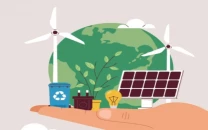Banks consider SME financing as highly risky
Funding drops to Rs537b by Feb-end from Rs586b in Dec 2022

As Pakistan grapples with an ongoing economic meltdown, the outlook on growth of small enterprises has been impacted significantly.
Financial institutions are increasingly seeing small and medium-sized enterprises (SMEs) at higher risk, leading to a reduction in overall funding support for such businesses.
This shift in attitude towards the SMEs reflects the challenging economic conditions and the resulting cautious approach in lending by the financial institutions.
Overall funding for the SMEs dropped to Rs537 billion by the end of February 2023 compared to Rs586 billion by December 2022, Karandaaz Pakistan Chief Investment Officer (CIO) Navid Goraya told The Express Tribune.
However, he said, through structured risk management banks should be able to mitigate risks and continue funding the sectors that were defensive in nature.
Although interest rate hikes by the State Bank should bring down inflation to 10.4% in 2025, as projected by the International Monetary Fund (IMF), “in the interim period businesses, especially the SMEs, are feeling the brunt of rising cost of doing business,” he said.
SMEs were indeed facing a credit crunch as banks were not willing to extend further financing, thus triggering acceleration in business contraction, Goraya pointed out.
“Rising input costs have put margins under pressure and volumes in some cases, but the major impact has been caused by the lack of funding.”
Interestingly, the microfinance sector, specifically microfinance institutions (MFIs), which primarily focus on agricultural and trade areas, are enjoying growth and the momentum is expected to continue throughout the year.
The aggregate asset quality remains healthy with an infection ratio slightly higher at around 6%. MFIs are faring better than microfinance banks.
Rising interest rates, inflation and supply chain bottlenecks have pushed banks to become more conservative and they are reluctant to increase exposure even to the existing clients.
This is constraining the available financing with SME finance at 7.2% of the overall private sector credit as of February 2023, showcasing a declining trend, according to Karandaaz, which is funding more than 2,600 SMEs along with banks via innovative programmes.
“As an impact fund for innovative credit interventions, we are encouraging banks and increasing risk-sharing to promote SME financing,” said the Karandaaz CIO.
In direct financing, “we are seeking companies which are well-managed, have stable demand and are unfairly being penalised by banks by freezing credit lines at current levels.”
Partnerships in the financial sector were a key element of the innovative financing, he said, adding “we have increased our allocation for funding in our annual plans.”
For equity investment interventions, the CIO revealed, Karandaaz has helped improve governance of investee partners and enhance the capability of management to ensure they forecast their business needs and cash flow.
“We have helped them in exploring export markets, hence they have not been impacted by the lack of bank financing. However, it is natural that inflationary pressures on both raw material and end-product have reduced their margins,” he said.
While inflationary pressures and interest rates have impacted the overall economy, the well-managed SMEs have been affected less while banks are open to either rescheduling loans or even extending additional financing.
In terms of climate action, Karandaaz is working on numerous initiatives.
“We are actively working to create Green Climate Fund with focus on significantly expanding intervention in renewable energy and energy efficiency, which should help promote sustainable economic growth,” it said.
Karandaaz is setting up SME Guarantee Company to cater to market gaps, created by the State Bank by not providing guarantees on SME lending by banks.
Published in The Express Tribune, April 22nd, 2023.
Like Business on Facebook, follow @TribuneBiz on Twitter to stay informed and join in the conversation.


















COMMENTS
Comments are moderated and generally will be posted if they are on-topic and not abusive.
For more information, please see our Comments FAQ